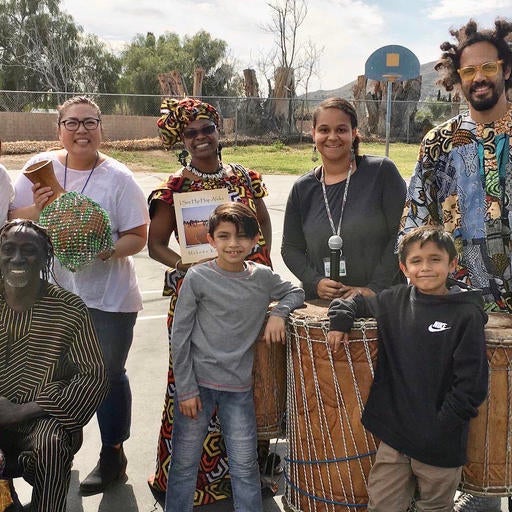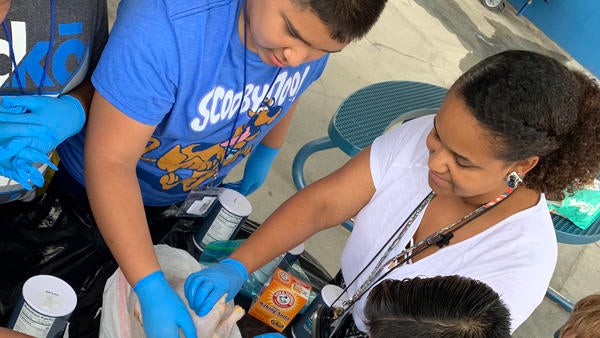As a child, Eliza Day spent much of her time playing school. Growing up with less financial resources than others meant that Eliza didn’t have access to cable, lush neighborhood parks, or after-school lessons, so she would ask her teachers for extra homework and books to borrow. She took her role of “teacher” to her younger siblings very seriously – taking attendance, taping papers to the wall to emulate a white board, and even sending her siblings outside for recess – and she would get very excited when her younger siblings mastered new skills under her tutelage.
It’s no surprise that her passion for education led this two-time alumna to her current career as a special education teacher for Colton Joint Unified School District.
What are your goals as a teacher? My first goal is to create an environment that students want to be in. I ask myself, if I were a student in my classroom, would I want to come to school every day? My classroom is a safe space where students are encouraged to take risks, try new things, laugh, love, and learn. I want my students to leave my classroom more confident than when they came in. I have witnessed over and over how confidence can play a role in how much students achieve.
Before any skill or lesson can be practiced and mastered, a student has to believe that they can master it, that their mind and focus and own worth are enough. I am always mindful of my students’ attitudes, self-esteem, and confidence levels, and I work to build up their belief in their own abilities. Essential to their learning process is a sense of calm, both in the classroom and within themselves, and we work on mastering their emotions, their concentration, and their perseverance.
Growth Mindset has played a role in shifting the attitude of the students in my classroom. My students learn that their brains can grow when they are calm and focused. Students learn to use mindfulness to prepare themselves for learning. We use meditation techniques, self-soothing strategies, and Restorative Circles to build a sense of community in the classroom, so that each student individually and the students together can feel safe, calm, productive, and capable.

As a former foster youth, you were part of the UCR Guardian Scholars program as an undergraduate. How did that program help you succeed in college? UCR’s Guardian Scholars program, under the direction of Tuppett Yates, was incredibly valuable to my education, not only because of their financial support but because the trust they placed in me, the expectations they had for me, and the encouragement they gave me made it seem possible for me, a first-generation college student as well as a foster care youth, to succeed, thrive, and graduate. I am forever grateful for the role the Guardian Scholars program played in my education.
Every student, whether they come from the foster care system, a home where English is the second or third language, a family without a history of college attendance, or a home with all the educational and economic advantages, needs the same things from their educational environment: High expectations, strong support, inspiration, respect, and the faith that she can succeed. I hope to provide this environment for my own students, as it was provided to me.
Can you talk about how the current situation with COVID-19 has impacted your role as an educational specialist? I am embracing all the technologies for communicating, not only with my students but with their parents. I read to my students via WebEx, send lessons and Hyperdocs via Google Classroom, check in frequently, and work with my students both collectively, and individually, every week. While I am eager to return to the classroom, to face-to-face instruction with my students, and to the in-person celebration of their accomplishments, learning to teach online has only strengthened my skills and my ability to provide my students (and their parents) with the support they need.
Learning to pre-record lessons via ScreenCastify and creating digital learning experiences means that I will be able to use these skills when we return to in-person instruction to further individualize education for my students in the classroom and at home. Students will be able to have their teacher, via pre-recorded videos, to enhance at-home study.
For special education students especially, the ability to watch a video more than once will be a valuable supplement, review, and enhancement of their learning process. And for the parents of these students, pre-recorded videos will help them to review with their children, to reinforce skills, and to prevent the loss of skills during periods of illness, vacation, or other absence.

How did the UCR teacher education program prepare you for the classroom? UCR’s master’s program gave me a solid foundation and taught me skills, strategies, and values that I use every day in the classroom. I could never have adjusted to remote instruction with confidence if I hadn’t learned such strong guiding principles at UC Riverside.
My professors, especially Dr. Paul Rosenzweig, encouraged me to build on what I’d already learned by pushing myself to learn creative ways to teach students with varying needs. Dr. Rosenzweig created a safe environment in which I felt confident stretching my skill set and my range of experiences, and I try to re-create that feeling in my own students now.
What advice do you have for aspiring special education teachers? Every teacher needs to bring patience, dedication, and love into the classroom; special education teachers especially need to feel genuine faith in their students’ abilities, to radiate appreciation for the small accomplishments each day brings, to wait patiently and react enthusiastically to each skill or task mastered. Students in special education programs have been told, too often, that they can’t, that they’re incapable, insufficient, broken. Our role in the special education classroom is to assure them that they can. The tasks may be different, may have to be adjusted to meet their different abilities, but their achievement – our pride in that achievement – is the same.
Do you have anything else you’d like to share? The fundamental lesson is that every student needs to hear that they can learn the material, can succeed, can make progress, and is worthy of a solid education. If we can teach them that confidence, along with the ability to manage their own attention and focus and mindfulness, we can teach them anything else.